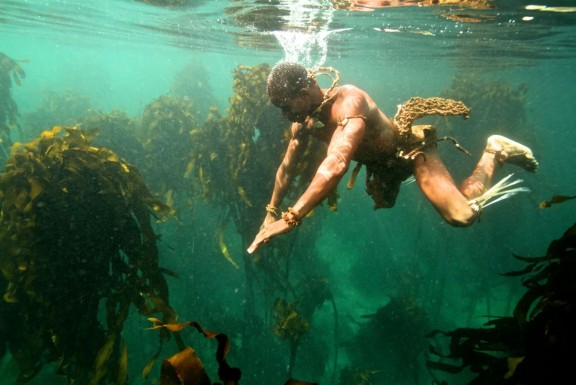
Free diving in the giant underwater kelp forests just outside Cape Town has to go down as one of the most exhilarating, rejuvenating and transformative encounters you could ever wish to experience. We first heard about cold water immersion a few months ago when we posted on the Sea-Change Project and its inspiring founders, journalist and entrepreneur, Ross Frylinck and acclaimed natural history filmmaker, Craig Foster.
Passionate about promoting and protecting our marine heritage, Ross and Craig’s work at Sea Change motivates a reconnection with ourselves through a deep immersion in nature. As passionate and committed cold-water divers, Ross and Craig have dived in these waters since childhood and consider it one of the most ‘scientifically intact time machines on earth.’ In fact, their belief is that this stretch of coastline could well be the cradle of the human mind. ‘Through my work with South African scientist, Dr Christopher Henshilwood, evidence suggests that there were innovations taking place here 60-to-100 000 years ago that were truly extraordinary for human culture,’ explains Craig. ‘So, from a human heritage perspective, it’s the most remarkable place on earth.’
With such pronouncements, we could think of no better chaperones for our first venture into the cold waters of these vast inshore kelp forests, found along the south west tip of South Africa. On the day we ventured into this magical wild place, we were joined by Faine Pearl, a film student and ocean ambassador, and Pippa Ehrlich, a conservation journalist who is working on a film called My Octopus Teacher with Craig.
The water was a tepid 16 degrees (compared to the usual 10 degrees in winter) and dressed in nothing more than a bathing suit, flippers, goggles and a snorkel, we availed ourselves to the experience for more than 30 minutes. ‘The physical benefits of swimming in cold water are well documented,’ says Craig. ‘But on a deeper level, when you immerse yourself in these ocean waters, you become a part of the incredible matrix of life.’ Interestingly, my overriding angst around the cold waters proved unfounded, for as soon as we entered the waters the sheer beauty of the pristine forests, the colors, the quietness and the diversity of marine life eclipsed all else. The privilege of seeing countless octopuses burrowed in their holes on the ocean floor camouflaged by dozens of shells clasped in their tentacles, with just a lone eye visible, remains a profound memory. As does the feeling of diving through the green kelp to spot the shy pyjama sharks that live there. Not to mention tiny soles, surprisingly large cuttlefish and the utter joy of holding an elegant brittle star in my palm, as its five slender arms expertly investigate the rest of my hand.
That Craig has dived here every day in his quest to learn the secrets of the Golden Forest, is as much to honour a pact he made to dive 365 times in a year, as it is a compulsion to explore another realm and to tell the stories of a natural world of which we know so little. ‘These kelp habitats are golden kingdoms that offer a safe haven for millions of incredible animals and sea life,’ says Craig, who has uncovered a plethora of new animal behaviors and at least five new species of shrimp, one of which has been named after him: Heteromysis Fosteri.
But then Craig is nothing if not dedicated to his subject matter. Almost twenty years ago, he and his brother Damon, produced an award-winning documentary about the Bushmen of the Kalahari, called The Great Dance that focused on the role of hunting in Bushmen society and psyche. To this end, the Foster brothers spent almost three years living with Bushmen hunters in Botswana’s Central Kalahari, so as to eloquently tell their stories. This was followed in 2003 by Cosmic Africa, a documentary about Africa’s ancient history of astronomy in an attempt to document how the knowledge of the sky was passed on from generation to generation. To this end, Craig and Damon consulted chiefs, calendar specialists, diviners, healers, storytellers, nomads, shamans, sky lore experts, archaeologists, linguists and anthropologists from six different countries as part of their celestial quest.

‘Early humans had a deep connection to a large number of species,’ he explains. ‘The Bushmen talk about these relationships with wild animals as ‘ropes to God’. These deep bonds with multiple species were like a deep love that has been all but lost in today’s world. ‘The implication for us is that our human relationships can never deliver the multiplicity of connection that comes with relationships across a multiple of species, and this puts pressure on our human relationships that is not sustainable.’
The latest BBC Blue Planet 2 series (it aired in the US late last year) chronicles Craig’s unique relationship with one of the most intelligent beings on the planet, an octopus that he named Superstar. It was an unorthodox relationship that began when Craig tracked her from den to den in these very waters. With time she would welcome him with flashes of electric color and eventually trusted Craig enough to let him go hunting with her, giving him unprecedented access into her world and the ultimate deep nature experience.
For Craig and Ross, deep nature is the essence and matrix of life, the motherboard if you will, within all of us. Swimming in an extreme environment like cold water is a deep immersion in nature in that it sets the neural networks in the brain alight to activate a sense of primal joy. ‘You need only look up the benefits of cold thermogenesis to understand how transformative it is,’ says Craig. Hours after my first dive, I remain on a natural high, my skin feels softer, my mind is clearer and days later I’m still regaling my cold water swim tales to all who will listen. Craig is not in the least surprised. ‘We enter another realm when we cut through the surface of the water,’ he says. ‘The combination of weightlessness, the cold, the incredible colors and of course the multiplicity of life under the sea conspired to recalibrate the senses to profound effect.’
For more information on the Sea-Change Project or if you would like us to include a cold-water immersion experience as part of your next Africa itinerary, mail welcome@roarafrica.com



